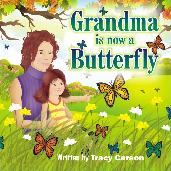Resource
Guide
Other Issues
Grief
Counseling, Writing a Eulogy, Writing
an Obituary
Planning
Resources Main Menu
Grief
Counseling
We do not propose to be
therapists or counselors at this site, but, having been through our share of
funerals and grieving for any number of reasons, we offer the following
support and advice.
Grief is an emotion that is
purely individual. Feelings of despair or sadness brought on by a sudden
death, or by a death after prolonged illness, are the same, but different.
For the most part, grief is a reaction to experiencing loss. In our society,
the death of a friend or family member is associated with varying degrees of
grief. We will discuss the issue of 'stages of grief', and the ability to
mourn, and we welcome your comments and experiences. It is often through
sharing that we find the most peace in our grief.
|
GRIEF & YOUNG
CHILDREN
Recently a generous author, Tracy Carson, wrote to us and offered to
share her book "Grandma is now a Butterfly" with you. Tracy
created the book to help children understand and cope with the loss of a
loved one. The story is based on the loss of her Mother and how she
helped her children understand and cope with such a tremendous loss.
The text version of
"Grandma is now a Butterfly" is available here: Explaining
death to young children. Tracy offers the full version with
illustrations on her website grandmaisnowabutterfly.
Your support of Tracy's work is encouraged and we thank her for her
generous gift.
|
Grandma
is now a Butterfly

By: Tracy Carson
|
EMOTIONS ASSOCIATED WITH
GRIEF
While the emotions listed here are by no means the only emotions
associated with grieving, they are the most prominent. You may also feel
tired, depressed and/or confused. The action of grieving is complicated and
may resolve itself in highs and lows, such as hopefulness one day and
hopelessness the next. Some people go into a protective mode of feeling (or
at least showing) no emotion at all. All of this is normal.
SHOCK: "I don't
believe it!"
DENIAL: "It's not true. He'll come through the door at any
moment."
GUILT: "I knew this would happen. I should have done
something."
ANGER: "How could she (he) do this to me?"
FEAR: "Will this happen to me? To my children? To my
family?"
MOURNING
Mourning is different than grieving. Mourning involves the public
display of grief. In other words, the wearing of black, the church services
to pray for the lost friend or family member, the seeking out of anyone
willing to talk about the loved one. Not all mourning is done publicly, but
mourning in and of itself is considered the public face we put on our grief.
STAGES OF GRIEF
Defined by Elsabeth Kubler-Ross in her book, "On Death and
Dying," Macmillan Publishing Company, 1969, the stages of grief are as
follows:
DENIAL: A refusal to
believe or accept what has happened.
ANGER : Blaming others for the loss. Blaming oneself for the loss.
BARGAINING: This can involve bargains with oneself, or with God.
DEPRESSION : Listlessness, tiredness, a feeling of being punished.
ACCEPTANCE: Realizing that life goes on, thereby allowing yourself
to heal.
You should be aware of the fact
that there are differing viewpoints on the validity of Ms. Kubler-Ross's
stages of grief, and we present them here only to help you identify and work
through your loss. You will notice that the 5 Stages of Grief are quite
similar to the emotions mentioned above. The important thing to remember is
that what you are feeling is personal and may or may not be identified by
the words written here.
ON-LINE RESOURCES
In our research on this
subject, the overwhelming response of grief counseling sites, funeral
information sites, and therapists offering online help, was to allow
yourself to let the grief out. Tears are acceptable and time is advised. Do
not suppress your tears, and do not rush your recovery.
At CounselingForLoss.com,
Grief Work is suggested.
Grief work can be summarized
by the acronym TEAR:
T = To accept the reality of the loss.
E = Experience the pain of the loss.
A = Adjust to the new environment without your [loved] one.
R = Reinvest in the new reality.
Visit the link above to learn
more about this valuable method of dealing with your grief. You are not
alone. Recovering from the death of a loved one is a difficult task. See
more writings at the links below.
Parallel
Support - Pregnancy & Infant Loss Support
The Grief Recovery
Institute® - Grief Recovery Support
Grief Loss &
Recovery - Articles, poems, and personal stories
ARCH National
Respite Network and Resource Center
National Hospice
Foundation - Info about hospice & quality of life
About
Death & Dying - Links to funeral planning and grief support
|

